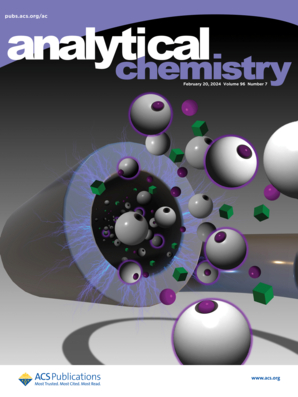亲和蛋白修饰的过氧亚硝酸盐活化条件化学探针。
IF 6.7
1区 化学
Q1 CHEMISTRY, ANALYTICAL
引用次数: 0
摘要
基于亲和的蛋白质标记化学探针是对天然蛋白质进行选择性化学修饰的宝贵工具。这种蛋白质标记策略通常依赖于“永远开”的反应性亲电试剂来实现蛋白质修饰。然而,在复杂的生物环境中,反应性亲电试剂也是探针不稳定和非选择性标记的原因。在本文中,我们引入了一种条件激活的基于亲和的蛋白质标记策略,其中探针被过氧亚硝酸盐激活,触发与位于附近的目标蛋白的标记反应。该条件激活蛋白标记探针由过氧亚硝酸盐反应性酰基肼、Cy5荧光染料和磺胺配体合成,用于识别人碳酸酐酶(hCA)蛋白。我们发现,在活细胞和体内存在过氧亚硝酸盐的情况下,可以实现hCA的特异性和快速标记。由于形成稳定的共价键,目标蛋白在体内的长期成像是可能的。此外,该探针还可用于检测巨噬细胞分泌的过氧亚硝酸盐。与以往基于甲基醌中间体形成的活性氧激活探针相比,我们的肼探针易于合成,并且在水溶液中更耐自水解。我们预计这种条件反应试剂将成为研究氧化应激条件下天然蛋白质化学修饰的宝贵工具。本文章由计算机程序翻译,如有差异,请以英文原文为准。
Peroxynitrite-Activated Conditional Chemical Probe for the Affinity-Based Protein Modification.
Affinity-based protein labeling chemical probes are invaluable tools for the selective chemical modification of native proteins. This protein labeling strategy generally relies on "always ON" reactive electrophiles to achieve protein modification. However, reactive electrophiles are also the causes of probe instability and nonselective labeling in complex biological environments. In this paper, we introduce a conditional-activated affinity-based protein labeling strategy in which the probe is activated by peroxynitrite, triggering a labeling reaction with the target protein located in the near proximity. This conditionally activated protein labeling probe was synthesized with a peroxynitrite-responsive acyl hydrazide, a Cy5 fluorescent dye, and a sulfonamide ligand for recognition with human carbonic anhydrase (hCA) protein. We showed that the specific and rapid labeling of hCA can be achieved in the presence of peroxynitrite in living cells and in vivo. Long-term imaging of the target protein in vivo is possible due to the formation of a stable covalent bond. Furthermore, the probe can also be used to detect peroxynitrite secreted from macrophage cells. As compared with the previous reactive oxygen species-activated probes based on the formation of quinone methide intermediate, our hydrazide probe can be easily synthesized and is more resistant to self-hydrolysis in aqueous solutions. We anticipate that such a condition-responsive reagent will become an invaluable tool for research involving the chemical modification of native proteins under oxidative stress conditions.
求助全文
通过发布文献求助,成功后即可免费获取论文全文。
去求助
来源期刊

Analytical Chemistry
化学-分析化学
CiteScore
12.10
自引率
12.20%
发文量
1949
审稿时长
1.4 months
期刊介绍:
Analytical Chemistry, a peer-reviewed research journal, focuses on disseminating new and original knowledge across all branches of analytical chemistry. Fundamental articles may explore general principles of chemical measurement science and need not directly address existing or potential analytical methodology. They can be entirely theoretical or report experimental results. Contributions may cover various phases of analytical operations, including sampling, bioanalysis, electrochemistry, mass spectrometry, microscale and nanoscale systems, environmental analysis, separations, spectroscopy, chemical reactions and selectivity, instrumentation, imaging, surface analysis, and data processing. Papers discussing known analytical methods should present a significant, original application of the method, a notable improvement, or results on an important analyte.
 求助内容:
求助内容: 应助结果提醒方式:
应助结果提醒方式:


